You can explore the vibrant world of GMO-free beer, where top brands like Northcoast Brewing Company and Sierra Nevada shine. With over twenty options, you'll savor unique flavors without worrying about genetically modified ingredients. Dogfish Head and Steam Whistle Brewing also offer delightful choices, focusing on organic ingredients and quality brews. When you choose these brands, you're not just tasting great beer; you're supporting healthier alternatives. As you enjoy your drink, you might be curious about the health benefits and certifications behind these brews. There's plenty more to uncover about this exciting and tasty realm of non-GMO beer!
Key Takeaways
- Northcoast Brewing Company and Sierra Nevada offer a variety of flavorful non-GMO beers, catering to diverse palates with IPAs and unique blends.
- Dogfish Head emphasizes organic ingredients, providing exceptional options like IPAs and stouts that showcase rich flavors and quality.
- Natureland Organic and Steam Whistle Brewing ensure GMO-free options, with products that maintain high-quality standards in every sip.
- Organic certifications require at least 95% organic ingredients, guaranteeing a tastier and healthier beer experience while supporting sustainable practices.
- Growing consumer interest in non-GMO and organic beers reflects a desire for healthier beverage alternatives, enhancing the overall beer market.
Top Brands Offering GMO-Free Beers
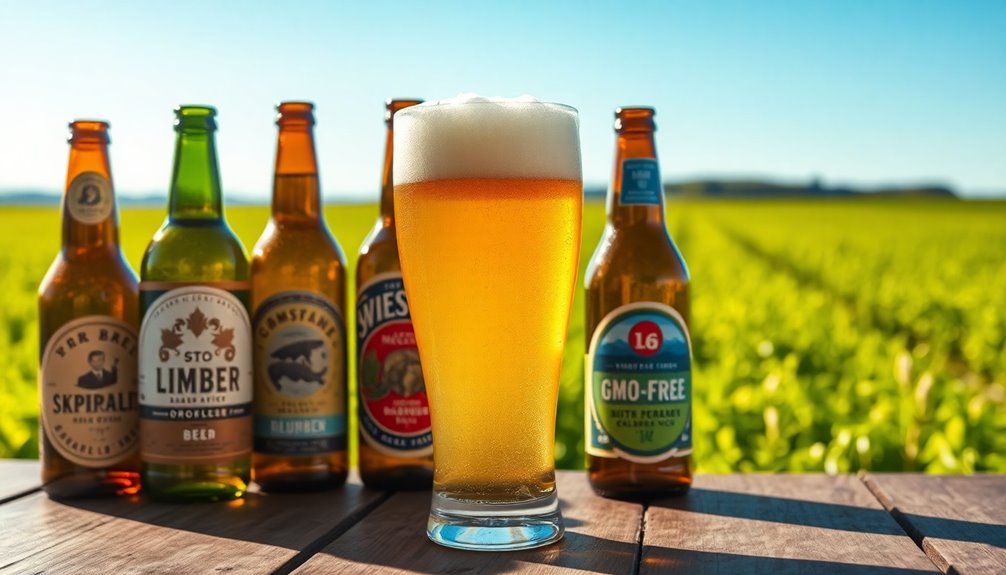
When you're on the hunt for GMO-free beers, several standout brands have got you covered. Northcoast Brewing Company is a great choice, offering over a dozen varieties, including IPAs and fruity blends. Their commitment to non-GMO brewing practices ensures that every sip is made without genetically modified ingredients.
If you enjoy a classic, Sierra Nevada's selection is impressive, with more than twenty non-GMO options, including their famous IPA. Dogfish Head also deserves a mention, with their focus on organic ingredients in beers like their IPA and Stout.
For something unique, check out Natureland Organic from British Columbia, which boasts a diverse range of GMO-free beers. If you're looking for specific products, Steam Whistle Brewing offers a GMO-Free Pilsner and a recent IPA, ensuring quality in every sip.
Heineken and Amstel Light are also solid picks, using non-GMO ingredients for a more natural experience.
Don't overlook Samuel Smith, known for their organic and vegan offerings, or Mill Street Brewery, which provides non-GMO options as well.
These brands are dedicated to delivering great-tasting beers without GMOs, so you can sip with confidence.
Certifications for Organic and Non-GMO
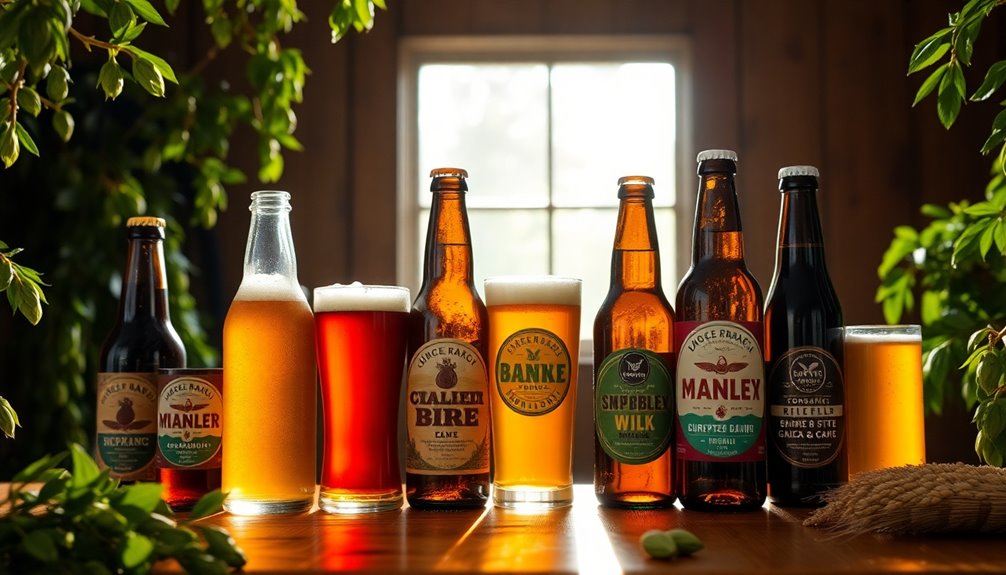
Certifications for organic and non-GMO beers play a crucial role in ensuring quality and transparency for consumers. When you choose organic beer, you can trust that it's brewed from at least 95% organically produced ingredients, with strict regulations governing the entire production process. Farmers must be organically certified, and annual inspections ensure compliance with USDA standards. Moreover, they must develop a detailed organic system plan to outline how they meet these regulations.
On the other hand, non-GMO certifications, like the Non-GMO Project, verify that no genetically modified ingredients are used. This certification is gaining traction in the beer industry as more consumers show interest in non-GMO products, often due to health concerns. Additionally, many consumers are attracted to supporting local farmers who practice sustainable agriculture by choosing organic options.
Remember, organic certifications inherently confirm non-GMO compliance since GMOs are prohibited in organic production. To maintain these certifications, breweries must keep meticulous records and update their organic system plans as practices change. They also need procedures to prevent contamination from nonorganic substances.
Ingredients Used in Production
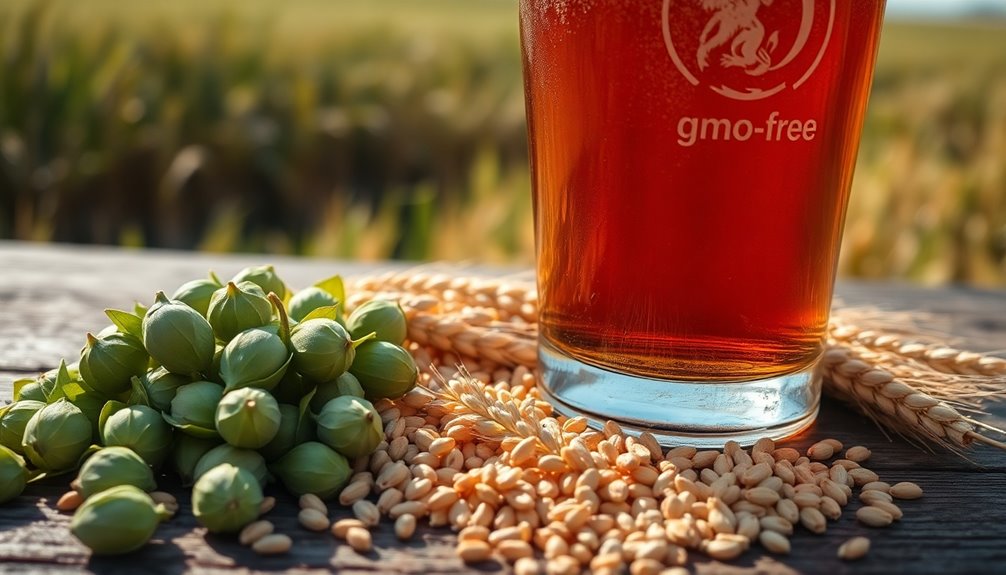
Understanding the ingredients used in brewing is vital for making informed choices about the beer you consume. Most beers primarily feature barley malt, which gives them their rich flavor. Yeast, often natural or traditional, plays a crucial role in fermentation, especially in non-GMO options. Hops, frequently sourced from specific regions like Germany, add bitterness and aroma, while water quality—whether spring water or sourced locally—can significantly impact the final product. The selection of ingredients can also determine the nutrient retention of the beer, similar to how it's considered in raw food diets. Additionally, using omega-3 rich ingredients in brewing can enhance the nutritional profile of certain specialty beers.
Some breweries incorporate wheat into their recipes, particularly in European markets, to create a distinct taste. When breweries commit to sourcing ingredients locally, they support local farmers and reduce their environmental footprint. This commitment to non-GMO farming practices often promotes biodiversity, which is a significant concern in modern agriculture. Additionally, using renewable energy sources in the brewing process can further enhance sustainability efforts.
For instance, brands like Sierra Nevada and Steamwhistle pride themselves on using organic ingredients, which help avoid chemicals and GMOs.
It's essential to be aware that while many breweries provide GMO-free guarantees, the presence of GMOs can be more common in North America, particularly in corn used in some recipes. Choosing non-GMO beers not only helps you enjoy a cleaner product but also supports traditional farming practices that prioritize health and sustainability.
Geographic Availability of Brands
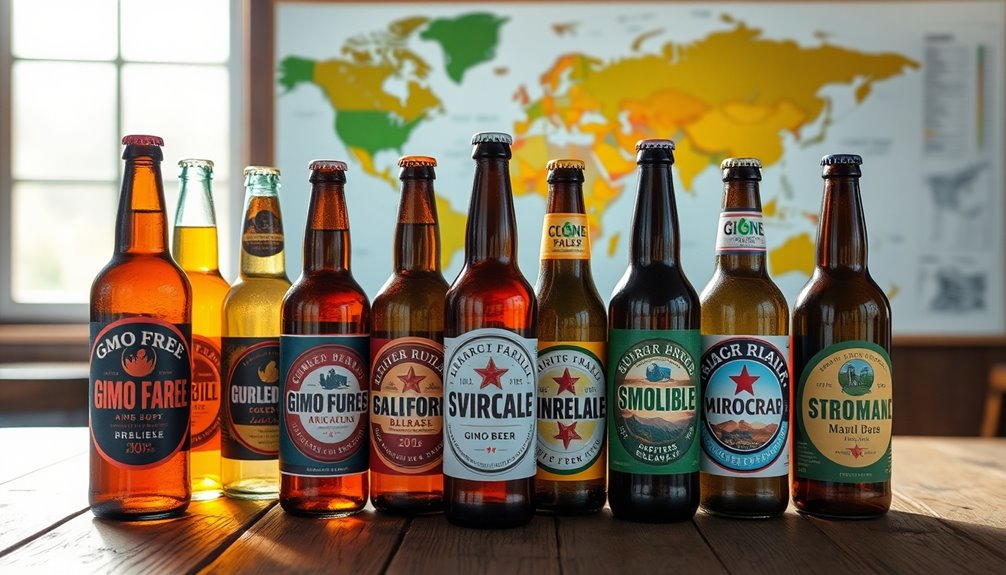
Geographic availability plays a crucial role in finding non-GMO beer brands that suit your taste. If you're in North America, you'll find brands like Sierra Nevada and Dogfish Head widely available across various states, especially in Delaware.
For those in Canada, Steam Whistle Brewing and Mill Street Brewery are popular choices, predominantly found in the Canadian market.
If you're exploring European options, Samuel Smith offers a classic UK experience and is available internationally. Pinkus, a German brand, is accessible mainly in Europe, while global giants like Heineken and Amstel Light can be found almost anywhere.
Microbreweries, like Northcoast Brewing Company and Buck Wild Brewing, focus on local distribution, primarily serving the West Coast. Ghostfish Brewing Company caters to the Pacific Northwest, while Holidaily Brewing Co. thrives in the Rocky Mountain region. It's worth noting that many of these beers are produced without the use of glyphosate chemicals, emphasizing healthier options for consumers.
Don't forget that many of these non-GMO beers are available online, which can expand your options beyond local shops. Specialty stores and health food markets often stock these beers, allowing you to discover new favorites without the hassle of searching everywhere.
Keep an eye out for local breweries, too; they often have unique offerings just around the corner!
Awards and Industry Recognition
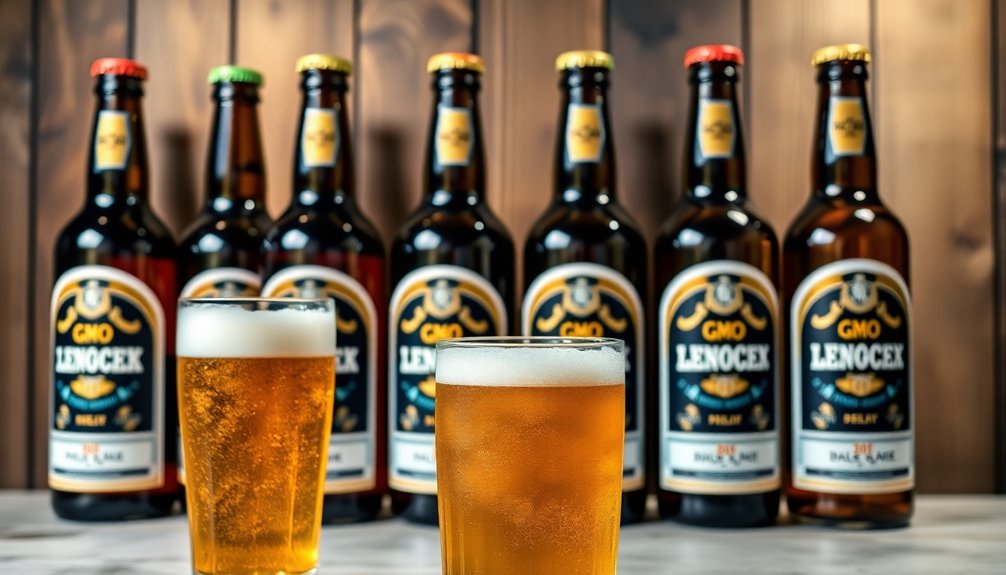
Awards and industry recognition play a vital role in highlighting the quality and innovation of GMO-free beer brands. At prestigious events like the World Beer Cup, TWØBAYS Brewing Co. won gold for their Session Ale in the Gluten Free category, showcasing the excellence of Australian craft brewing. This competition, often dubbed "the Olympics of beer," features over 9,300 entries from around the globe, emphasizing the significance of such accolades. The win by TWØBAYS is particularly notable as it marks only the fifth time an Australian brewery has achieved gold in the competition's history.
Peak Organic Brewing's achievement as the first Non-GMO Project verified brewer demonstrates their commitment to transparency, resonating with consumers who prioritize quality.
Similarly, Wiper and True's gold medal for their 0.5% Kaleidoscope at the World Alcohol-Free Awards reflects the growing recognition of high-quality, alcohol-free options.
These awards not only elevate individual brands but also push the industry toward higher quality standards. As consumer interest in non-GMO and specialized beers rises, breweries are increasingly pursuing certifications, further promoting trust and transparency.
Ultimately, these accolades serve as benchmarks, helping you make informed choices about the beers you enjoy.
Health-Conscious Brewing Options
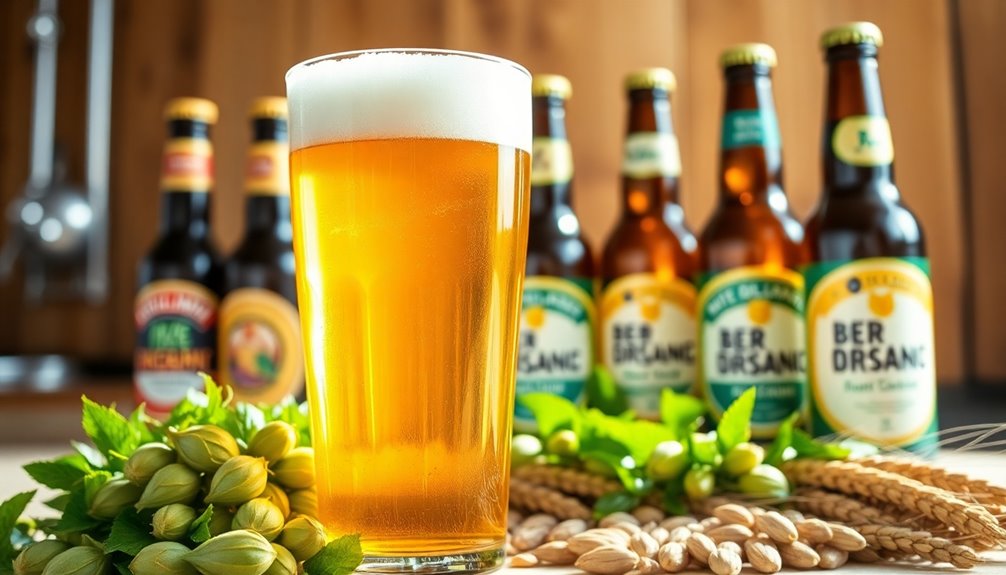
When it comes to making healthier choices, health-conscious brewing options like non-GMO and non-alcoholic beers stand out for their numerous benefits.
These beers not only provide a delicious alternative but also pack a nutritional punch. Non-alcoholic beer is rich in B vitamins, aiding energy metabolism and supporting your nervous system. It's also a good source of essential minerals like magnesium and calcium, promoting bone and muscle health. Additionally, many non-alcoholic options contain low calories, making them suitable for weight management. Furthermore, they can also support gut microbiota, enhancing overall digestive health. Drinking non-alcoholic beer in moderation can also help prevent digestive upset, making it a gentle option for sensitive stomachs. Incorporating leafy greens into your diet alongside these beers can further enhance cognitive performance and overall health. Moreover, these beers allow you to fully experience the benefits of high vibrational energy without the negative effects of alcohol.
Hydration is another key advantage. Non-alcoholic beer helps prevent fluid retention and supports kidney and liver function without the dehydrating effects of alcohol.
Plus, the hops used have calming properties, reducing stress and improving your mood while promoting better sleep quality.
Sustainability matters too. Many non-GMO beers are crafted using organic and locally sourced ingredients, which not only enhances their flavor but also supports local farmers.
By choosing these brews, you're avoiding artificial additives and preservatives, ensuring a cleaner, healthier drinking experience.
Frequently Asked Questions
What Distinguishes Gmo-Free Beers From Regular Beers?
GMO-free beers stand out because they use natural ingredients, like barley malt and hops, without any genetically modified organisms.
You'll find these beers often brewed with local, high-quality ingredients, avoiding artificial additives and fillers.
The brewing process typically relies on traditional techniques, enhancing flavor and authenticity.
Plus, they lower health risks linked to GMOs and support sustainable practices, benefiting both local farmers and the environment.
You'll definitely taste the difference!
How Can I Identify Gmo-Free Beers in Stores?
To identify GMO-free beers in stores, start by looking for labels that say 'Non-GMO' or 'GMO-Free.'
Check the ingredient list for organic components and traditional brewing methods.
Research brands known for non-GMO practices and verify their claims on websites or packaging.
Don't rely on vague terms like 'all-natural.'
You can also ask store staff for recommendations and use online resources to find beers that meet your non-GMO preferences.
Are Gmo-Free Beers More Expensive Than Regular Beers?
Yes, GMO-free beers are often more expensive than regular beers.
This price difference stems from the use of organic and non-GMO ingredients, which can be costlier to source. Additionally, the production process for GMO-free beers involves extra steps to ensure quality and compliance.
However, some brands, like Sierra Nevada, may have prices similar to non-GMO options.
Ultimately, you'll notice variations based on the brand, ingredients, and market demand.
Do Gmo-Free Beers Taste Different From Traditional Beers?
Yes, GMO-free beers do taste different from traditional beers.
You might notice a unique flavor profile due to alternative grains like buckwheat or quinoa, which can create a harsher twang that contrasts with hops.
Some GMO-free options balance well, offering earthy or citrusy notes, while others may lack the depth of traditional brews.
Can I Find Gmo-Free Beer in All Regions?
You can find GMO-free beer in many regions, but availability varies.
Brands like Sierra Nevada and Steamwhistle are widely distributed in the U.S. and Canada.
Mongozo offers international options, while Glutenberg is found across North America, though some states may lack access.
To locate GMO-free beers near you, check local retailers or brand websites for distribution information.
Exploring these options will help you enjoy a GMO-free brew wherever you are.
Conclusion
When you choose GMO-free beer, you're not just making a healthier choice; you're also supporting brands that prioritize quality and sustainability. With a variety of top brands available, each offering unique flavors and ingredients, there's something for everyone. Plus, the certifications and awards these beers have received highlight their commitment to excellence. So next time you grab a cold one, consider going GMO-free and taste the difference for yourself! Cheers to better brewing!










